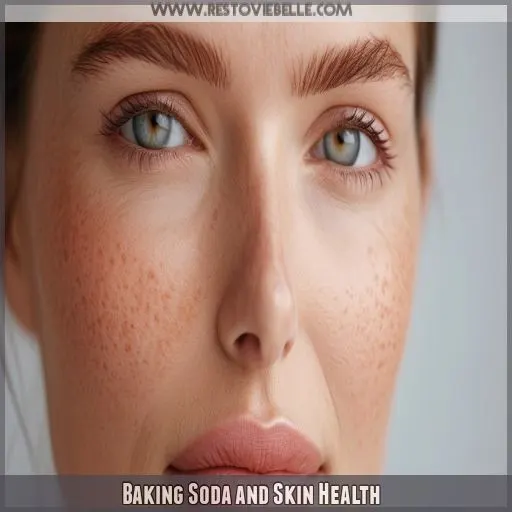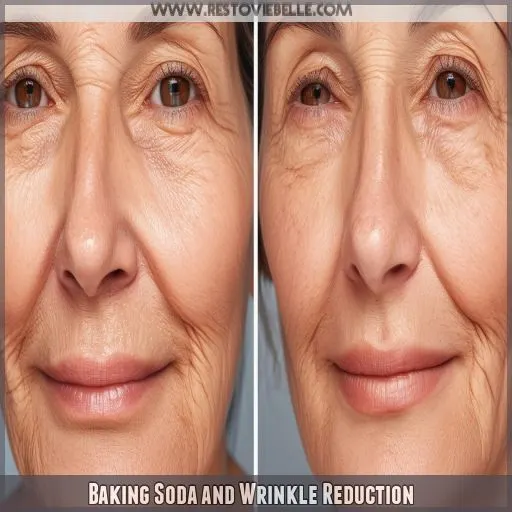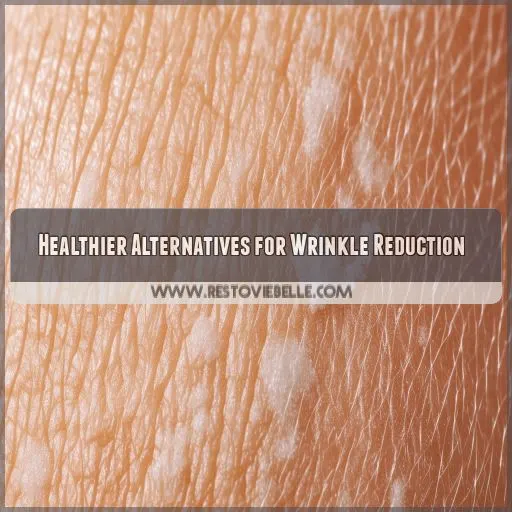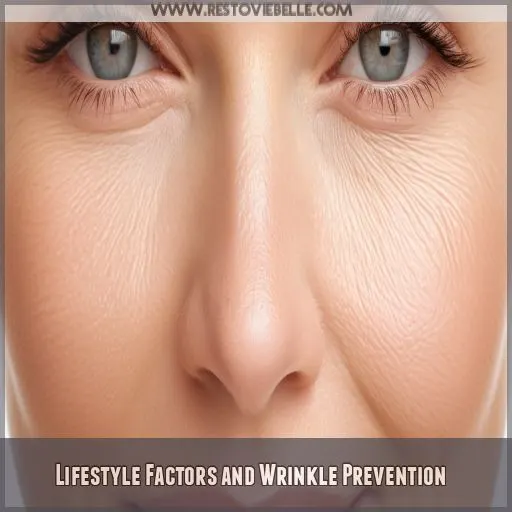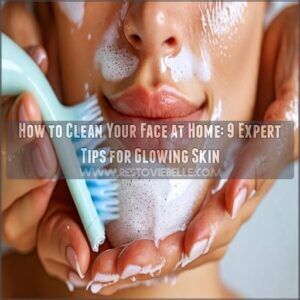This site is supported by our readers. We may earn a commission, at no cost to you, if you purchase through links.
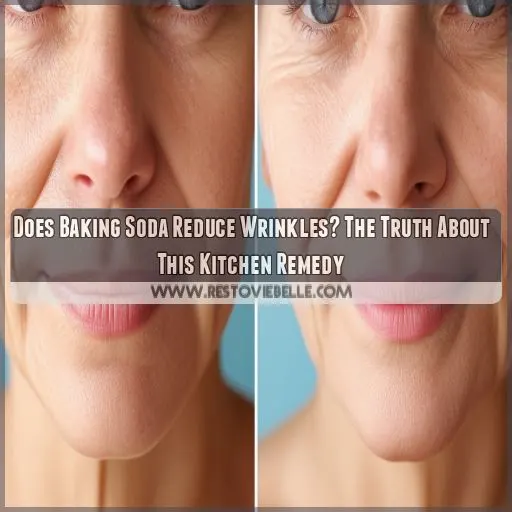 Contrary to popular belief, baking soda doesn’t reduce wrinkles and can actually harm your skin. While it might seem like a handy kitchen remedy, using baking soda on your face can disrupt your skin’s pH balance, leading to dryness, irritation, and even worsening of fine lines.
Contrary to popular belief, baking soda doesn’t reduce wrinkles and can actually harm your skin. While it might seem like a handy kitchen remedy, using baking soda on your face can disrupt your skin’s pH balance, leading to dryness, irritation, and even worsening of fine lines.
It’s too harsh as an exfoliant and can damage your skin’s protective barrier.
Instead, focus on proven anti-aging ingredients like retinoids and antioxidants, and don’t forget the importance of sunscreen and a healthy lifestyle.
If you’re looking to turn back the clock, there are safer and more effective options to explore than that box of baking soda in your pantry.
Table Of Contents
- Key Takeaways
- Does Baking Soda Reduce Wrinkles?
- Baking Soda and Skin Health
- Baking Soda and Wrinkle Reduction
- Healthier Alternatives for Wrinkle Reduction
- Lifestyle Factors and Wrinkle Prevention
- Frequently Asked Questions (FAQs)
- How to get rid of wrinkles with baking soda?
- Does baking soda get rid of crepey skin?
- What is the best home remedy for wrinkles?
- Is putting baking soda on your face good?
- How long does a baking soda mask take to work?
- Can baking soda be mixed with other ingredients?
- Is baking soda effective for all skin types?
- How often should baking soda treatments be applied?
- Are there any immediate side effects of baking soda use?
- Conclusion
Key Takeaways
- Baking soda is more foe than friend for your face. While it may seem like a thrifty trick, slathering this kitchen staple on your skin is about as wise as using sandpaper as a pillow. It disrupts your skin’s delicate pH balance faster than you can say "premature aging."
- Forget the fizz, focus on the facts. When it comes to battling wrinkles, baking soda is like bringing a spoon to a gunfight. Instead, arm yourself with proven anti-aging ingredients like retinoids and antioxidants – they’re the Navy SEALs of skincare.
- Your skin’s happiness hinges on more than just what you slather on it. Think of your face as a garden – it needs sun protection (but not too much!), nourishment from a healthy diet, and a stress-free environment to truly flourish. No baking soda required!
- If you’re tempted to raid your pantry for skincare solutions, step away from the baking soda and toward the olive oil. Better yet, save the DIY spirit for your next craft project and trust the scientists who’ve dedicated their lives to keeping your skin as smooth as a baby’s bottom.
Does Baking Soda Reduce Wrinkles?
No, baking soda doesn’t effectively reduce wrinkles. While it may temporarily exfoliate skin, baking soda can disrupt skin’s natural pH balance and cause irritation, potentially worsening the appearance of wrinkles over time.
Baking Soda and Skin Health
You might’ve heard that baking soda can work wonders for your skin, but it’s important to understand its effects and potential risks. While baking soda has antibacterial properties, it can disrupt your skin’s natural pH balance and cause dryness, irritation, and even worsen conditions like acne or atopic dermatitis.
Baking Soda’s Effects on Skin
Baking soda’s effects on your skin can be a double-edged sword. While it’s often touted as a natural remedy, its high pH can disrupt your skin’s delicate balance. Here’s what you need to know:
- It can alter your skin’s natural pH, potentially leading to irritation.
- Its abrasive nature might exacerbate fine lines and wrinkles.
- Some people experience increased sensitivity after using baking soda on their skin.
Potential Risks of Using Baking Soda on Skin
While baking soda might seem like a harmless kitchen staple, using it on your skin can pose some risks. Here’s what you need to know:
- Disrupts skin’s natural pH balance
- Can cause dryness and irritation
- May worsen acne and atopic dermatitis
- Acts as a harsh mechanical exfoliant
Unlike gentler chemical exfoliants like alpha hydroxy acids, baking soda’s abrasive nature can damage your skin barrier. It’s best to stick with dermatologist-approved skincare products for safer and more effective results.
Baking Soda and Wrinkle Reduction
While baking soda can act as a mild exfoliant, removing dead skin cells and potentially improving skin texture, it’s not an effective solution for reducing wrinkles. The abrasive nature of baking soda may cause irritation and damage to your skin’s protective barrier, potentially worsening the appearance of fine lines and wrinkles over time.
Baking Soda as an Exfoliant
Baking soda’s mild abrasive properties make it a popular DIY exfoliant. When used sparingly, it can help remove dead skin cells, potentially giving your skin a smoother appearance. However, it’s important to understand that exfoliation alone won’t reduce wrinkles. Additionally, baking soda’s alkaline nature can disrupt your skin’s pH balance, leading to:
- Increased skin sensitivity
- Potential over-exfoliation
- Risk of skin dryness and irritation
Consider gentler alternatives like coconut oil or turmeric-based scrubs for safer exfoliation.
Limitations of Baking Soda for Wrinkles
While baking soda might seem like a quick fix for wrinkles, it’s important to understand its limitations. Research doesn’t support claims that it can reduce wrinkles or prevent aging. In fact, using baking soda on your skin can be dangerous:
- It disrupts your skin’s natural pH balance
- It can cause irritation and dryness
- It may worsen existing skin conditions
Instead, focus on proven wrinkle-fighting methods like sun protection, a healthy diet, and stress management.
Healthier Alternatives for Wrinkle Reduction
Instead of using baking soda, you’ll find more effective wrinkle-reducing ingredients in skincare products containing retinoids, antioxidants, and moisturizers. These scientifically-backed components can help improve skin texture, boost collagen production, and hydrate your skin, potentially leading to a reduction in the appearance of fine lines and wrinkles.
Retinoids
Retinoids are your skin’s best friend in the battle against wrinkles. Research demonstrates that these vitamin A derivatives deliver substantial benefits:
- Stimulate collagen production
- Accelerate cell regeneration
- Enhance skin texture
- Equalize skin tone
While retinol is the most accessible over-the-counter option, prescription-strength retinoids are also available. Be aware of their potency and introduce them gradually, using a gentle moisturizer to maintain your skin’s pH balance. Your future self will be grateful!
Antioxidants
Antioxidants are your skin’s best friends in the fight against wrinkles. They protect your skin from free radical damage and boost collagen production, helping to keep your complexion youthful and bright. Incorporating antioxidant-rich ingredients into your skincare routine can be a game-changer for reducing the appearance of fine lines and wrinkles.
- Vitamin C: Brightens skin and stimulates collagen
- Green tea: Offers powerful sun protection
- Resveratrol: Fights cellular aging
- Niacinamide: Improves skin elasticity
- Coenzyme Q10: Energizes skin cells
Moisturizers
While antioxidants protect your skin, moisturizers keep it hydrated and plump. Unlike baking soda, which can disrupt your skin’s pH balance, moisturizers maintain its natural barrier. They’re essential for reducing the appearance of wrinkles and preventing skin irritation. Here are four key benefits of using moisturizers:
- Lock in hydration
- Improve skin elasticity
- Reduce fine lines
- Enhance overall skin health
Lifestyle Factors and Wrinkle Prevention
You can greatly reduce wrinkle formation by adopting key lifestyle habits. Shielding your skin from sun damage, maintaining a balanced diet rich in antioxidants, and managing stress effectively are essential steps in preserving your skin’s youthful appearance.
Sun Protection
Sun exposure is the leading cause of premature aging and wrinkles. To protect your skin, use a broad-spectrum sunscreen with at least SPF 30 daily. Don’t rely on baking soda; it won’t reduce wrinkles or shield you from harmful UV rays. Here’s how to safeguard your skin:
- Apply sunscreen 15-30 minutes before going outside
- Reapply every 2 hours or after swimming/sweating
- Wear protective clothing, like wide-brimmed hats
- Seek shade during peak sun hours (10 am – 4 pm)
- Use SPF-infused makeup for added protection
Healthy Diet
While sun protection is essential, your diet also plays a significant role in skin health. Eating nutrient-rich foods can help combat wrinkles from the inside out. Here are some key dietary factors:
- Consume antioxidant-rich fruits and vegetables to fight free radicals
- Incorporate omega-3 fatty acids from fish or dietary supplements
- Stay hydrated by drinking plenty of water throughout the day
Stress Management
Chronic stress can wreak havoc on your skin’s pH balance and barrier function, potentially accelerating the aging process. While baking soda isn’t a solution, managing stress is fundamental for maintaining healthy skin. Here are four stress-reduction techniques to help combat inflammation and preserve your skin’s youthful appearance:
- Practice deep breathing exercises
- Engage in regular meditation sessions
- Enjoy a soothing bubble bath with lavender oil
- Take a leisurely walk in nature
Frequently Asked Questions (FAQs)
How to get rid of wrinkles with baking soda?
You shouldn’t use baking soda for wrinkles. It’s harsh on your skin and can disrupt its natural balance. Instead, focus on proven methods like sun protection, hydration, and retinol-based products for healthier, younger-looking skin.
Does baking soda get rid of crepey skin?
While baking soda’s exfoliating properties might temporarily smooth skin, it won’t effectively treat crepey skin. You’re better off using moisturizers with hyaluronic acid and retinoids. These ingredients hydrate and boost collagen production, addressing the root causes of skin aging.
What is the best home remedy for wrinkles?
You’ll find the best home remedy for wrinkles in your daily habits. Protect your skin with SPF, stay hydrated, and use retinol products. Don’t forget to nourish your body with antioxidant-rich foods and get quality sleep.
Is putting baking soda on your face good?
Putting baking soda on your face isn’t recommended. It’s harsh and can disrupt your skin’s natural pH balance. You’re better off using gentle, pH-balanced cleansers and moisturizers to keep your skin healthy and happy.
How long does a baking soda mask take to work?
You shouldn’t use baking soda masks on your face. They can disrupt your skin’s natural pH balance and cause irritation. Instead, focus on proven skincare methods like wearing sunscreen, staying hydrated, and using gentle, dermatologist-recommended products for healthier skin.
Can baking soda be mixed with other ingredients?
Imagine a garden where ingredients bloom. You can mix baking soda with other natural elements, but it’s not recommended. Combining it with lemon juice or vinegar might create a fizzy reaction, potentially irritating your skin. Proceed with caution.
Is baking soda effective for all skin types?
Baking soda isn’t effective for all skin types. It’s harsh and can disrupt your skin’s natural pH balance. You’re better off using gentler, scientifically-proven ingredients designed for your specific skin type for the best results.
How often should baking soda treatments be applied?
Imagine Sarah, who tried a daily baking soda scrub. It’s not recommended to use baking soda treatments frequently. They can disrupt your skin’s natural pH balance and cause irritation. Instead, focus on gentler, proven skincare methods for healthier results.
Are there any immediate side effects of baking soda use?
You might experience immediate skin irritation, redness, or dryness when using baking soda. It can disrupt your skin’s natural pH balance, potentially leading to increased sensitivity. There’s also a risk of burning or stinging sensations, especially on delicate areas.
Conclusion
Wondering if baking soda is the secret to youthful skin? Think again. While it’s tempting to try kitchen remedies, baking soda doesn’t reduce wrinkles and can harm your skin.
Instead, focus on proven anti-aging ingredients like retinoids and antioxidants.
Don’t forget the basics: protect your skin from sun damage, maintain a healthy diet, and manage stress.

